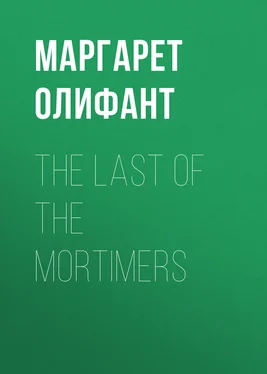Маргарет Олифант - The Last of the Mortimers
Здесь есть возможность читать онлайн «Маргарет Олифант - The Last of the Mortimers» — ознакомительный отрывок электронной книги совершенно бесплатно, а после прочтения отрывка купить полную версию. В некоторых случаях можно слушать аудио, скачать через торрент в формате fb2 и присутствует краткое содержание. Жанр: Альтернативная история, Исторические приключения, на английском языке. Описание произведения, (предисловие) а так же отзывы посетителей доступны на портале библиотеки ЛибКат.
- Название:The Last of the Mortimers
- Автор:
- Жанр:
- Год:неизвестен
- ISBN:нет данных
- Рейтинг книги:3 / 5. Голосов: 1
-
Избранное:Добавить в избранное
- Отзывы:
-
Ваша оценка:
- 60
- 1
- 2
- 3
- 4
- 5
The Last of the Mortimers: краткое содержание, описание и аннотация
Предлагаем к чтению аннотацию, описание, краткое содержание или предисловие (зависит от того, что написал сам автор книги «The Last of the Mortimers»). Если вы не нашли необходимую информацию о книге — напишите в комментариях, мы постараемся отыскать её.
The Last of the Mortimers — читать онлайн ознакомительный отрывок
Ниже представлен текст книги, разбитый по страницам. Система сохранения места последней прочитанной страницы, позволяет с удобством читать онлайн бесплатно книгу «The Last of the Mortimers», без необходимости каждый раз заново искать на чём Вы остановились. Поставьте закладку, и сможете в любой момент перейти на страницу, на которой закончили чтение.
Интервал:
Закладка:
This was all the sympathy I got from little Sara. Of course I could no more have told her the puzzle my mind was in than I could have told the servants; but still, you know, an intelligent young person might have guessed by my looks and been a little sympathetic;—though to be sure there is no use pretending with one’s self. I do believe I liked Sara twenty times better for taking no notice;—and then, how cleverly the little kitten had got through her work!
We saw nothing more of Sarah that night. When it was time for tea, Carson came down again with missus’s compliments, and she was tired with her long drive, and would have tea in her own room. I said nothing at all, but handed her the Times. I don’t doubt Sarah had her tea very snug in her nice cosy dressing-room, with Carson purring round her and watching every move she made. I never could manage that sort of thing for my part. Little Sara and I, however, though her godmamma deserted us, were very comfortable, on the whole, downstairs.
Chapter IX
WE had both been reading almost all the evening. Sara had her novel, and I had the Times Supplement, which I am free to confess I like as well as any other part of the paper. I will not deny that I finished the third volume before I began to the newspaper; but, to be sure, a novel, after you are done with it, is an unsatisfactory piece of work; especially if the evening is only half over, and you have nothing else to begin to. I sat leaning back in my chair, wandering over the advertisements, and very ready for a talk. That is just the time, to be sure, when one wants somebody to talk to. If I had ever been used to the luxury of a favourite maid when I was young, as Sarah was, I do believe I should have been in my own cosy room now as well as Sarah, talking everything over with my Carson. But that is not the way I was brought up, you see. To be sure, as there was ten years of difference between us, nobody had ever looked for me, and Sarah had got quite settled in her heiress ways before I was born. When I was young, I used to think it a sad pity for everybody’s sake that I ever was born, especially after my mother died; however, I changed my views upon that subject a good many years ago. Yet here I sat looking all over the advertisements, and keeping an eye on Sara to see if there was any hope of getting a little conversation out of her. Alas! she was all lapped up and lost in her novel. She thought no more of me than of Sarah’s empty chair. Ah! novels are novels when people are young. I looked at the poor dear child, and admired and smiled at her over the top of the newspaper. If I had been a cabbage, Sara could not have taken less notice of me.
At last she suddenly exclaimed out loud—at something she was reading, of course—“I declare!” as if she had made a discovery, and then stopped short and looked up at me with a sort of challenge, as if defying me to guess what she was thinking of. Then, seeing how puzzled I looked, Sara laughed, but reddened a little as well, to my amazement; and finally, not without the least little touch of confusion, explained herself. To be sure it was quite voluntary, and yet a little unwilling too.
“There’s something here exactly like the Italian gentleman; he that people talk so much about in Chester, you know.”
“I never knew there was an Italian gentleman in Chester. What a piece of news! and you never told me,” said I.
“He only came about a fortnight ago,” said Sara. “It looks quite romantic, you know, godmamma, which is the only reason I have heard anything about it. He came quite in great style to the Angel, and said he was coming to see some friends, and asked all about whether anybody knew where the Countess Sermoneta lived. You may be quite sure nobody had ever heard of such a name in Chester. I heard it all from Lucy Wilde, who had heard it from her brother, who is always playing billiards and things at the Angel—Harry Wilde–”
“That is the poor young man who–”
“Oh, dear godmamma, don’t bother! let one go on with one’s story. Harry Wilde says the Italian came down among them, asking everybody about this Countess Sermoneta, and looking quite bewildered when he found that nobody knew her; but still he was quite lively, and thought it must be some mistake, and laughed, and made sure that this was really Chestare he had come to, and not any other place. But next day, people say, he sent for the landlord and asked all about the families in the neighbourhood, and all of a sudden grew quite grave and serious, and soon after took lodgings in Watergate, and has been seen going about the streets and the walls so much since that everybody knows him. He speaks English quite well—people say so, I mean—and he has a servant with him, the funniest-looking fat fellow you ever saw; no more like a proper Italian servant in a play or a novel than I am; and he calls himself just Mr. Luigi; and that, of course, you know, must be only his Christian name.”
“Nay, indeed, Sara, I don’t know anything about it. There is nothing at all Christianlike in the name, so far as I can see.”
“Well then, I know, godmamma, which is all the same,” cried the impatient little creature; “but then, to be sure, our old Signor Valetti used to tell us they never minded their family names in Italy; and that people might be next-door neighbours for ever so long and never know each other’s surnames. Isn’t it pretty? especially when they have pretty Christian names, as all the Italians have.”
“My dear, if you think Looegee pretty, I don’t,” said I. “Take my word for it, there is nothing like the sensible English names. I’ve had a good deal of experience, and I don’t like your romantic foreigners. For my part, I don’t like people that have a story. People have no right to have stories, child. If you do your duty honestly, and always tell the truth, and never conceal anything, you can’t get up a romance about yourself. As for this Italian fellow and his name–”
“I don’t believe he’s a fellow any more than you are, godmamma,” cried Sara, quite indignantly; “people should know before they condemn; and his name is just plain Lewis when it’s put into English. I did not think you were so prejudiced, indeed I did not—or I never would have told you anything at all about the poor count–”
“Heaven preserve us! he’s a count, is he?” said I. “And what do you know about him, Sara Cresswell, please, that you would quarrel with your own godmother for his sake?”
Sara did not speak for a few minutes, looking very flushed and angry. At last, after a good fight with herself, she started up and threw her arms round my neck. “Dear godmamma, I wouldn’t quarrel with you for anybody in the world,” cried the little impulsive creature. Then she stopped and gave a little toss of her head. “But whatever anybody says, I know it’s quite right to feel kind to the poor Italian gentleman, a stranger, and solitary, and disappointed! I do wonder at your people, godmamma—you people who pretend to do what’s in the Bible. You’re just as hard upon strangers and as ready to take up a prejudice as anybody else.”
“I never pretended not to be prejudiced,” said I; “it’s natural to a born Englishwoman. And as for your foreign counts, that come sneaking into people’s houses to marry their daughters and run off with the money–”
“Oh, if it is that you are thinking of, godmamma,” cried Sara with great dignity, sitting quite bolt upright in her chair, “you are totally mistaken, I assure you. I never spoke to the gentleman in my life; and besides,” she went on, getting very red and vehement, “I never will marry anybody, I have quite made up my mind; so, if you please, godmamma, whatever you choose to say about poor Mr. Luigi, whom you don’t know anything about , I hope you will be good enough not to draw me into any stupid story about marrying—I quite hate talk of that kind.”
Читать дальшеИнтервал:
Закладка:
Похожие книги на «The Last of the Mortimers»
Представляем Вашему вниманию похожие книги на «The Last of the Mortimers» списком для выбора. Мы отобрали схожую по названию и смыслу литературу в надежде предоставить читателям больше вариантов отыскать новые, интересные, ещё непрочитанные произведения.
Обсуждение, отзывы о книге «The Last of the Mortimers» и просто собственные мнения читателей. Оставьте ваши комментарии, напишите, что Вы думаете о произведении, его смысле или главных героях. Укажите что конкретно понравилось, а что нет, и почему Вы так считаете.












